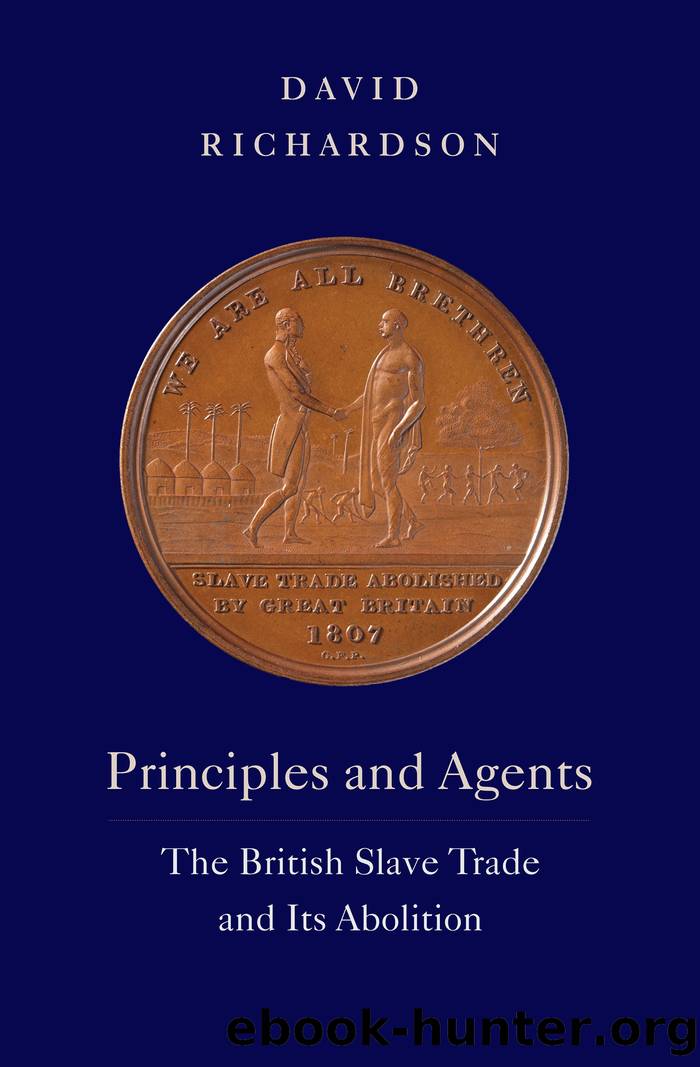Principles and Agents by David Richardson

Author:David Richardson
Language: eng
Format: epub
Publisher: Yale University Press
Published: 2022-06-15T00:00:00+00:00
NINE
Finding âa Pathway for the Humanitiesâ
The Politics of Slave Trade Abolition, 1791â1807
IN HIS Address to the People of Great Britain, on the Propriety of Refraining from the Use of West India Sugar and Rum, published in 1791, the radical dissenter and bookseller William Fox accused the nationâs consumers of British Caribbean sugar of being complicit in slavery and, given sugar productionâs costs in terms of African life, in supporting the nationâs slave trade. The Address is widely seen as the most influential of the many and various pamphlets Fox wrote and published in his lifetime. It rapidly went through multiple editions and, though estimates vary, may have sold between seventy thousand and two hundred thousand copies in Britain and the Americas. It is credited with helping to stimulate the sugar boycott that occurred in Britain in 1792 as one element of the extraparliamentary campaign to end the slave trade that peaked in that year. Even as he sought, however, to challenge people to change their behavior, Fox recognized that getting them to do so would not be easy, noting in the pamphletâs conclusion that âhardened by habit, the mind is with difficulty accessible to the convictions of guilt.â He went on to observe how âactions are not easily influenced by the force of moral principle, when counteracted by customâ and when âthe greatest violations of duty may be practiced by the conduct of our associates.â In effect, tensions within individuals or groups could exist in reconciling actual behavior, rooted in habits or customs, with doing what was morally right. For Fox, change represented âthe test of our virtue,â requiring individuals âto investigate [their] conduct with the most anxious solicitude.â1
Viewed through a society-wide rather than an individual lens, Foxâs remarks take on fresh significance in the politics of abolitionism. Metaphorically, they are a reminder that the antiâslave trade campaign, driven by its religious attendants or feelings of guilt, was confronted, even at a time of revolutionary domestic industrial and social change, by powerful conservative, even reactionary, forces deeply committed to what Fox labeled prevailing customs and associations, whether in defense of an established identity, an ideological outlook, or a vested interest. Those invested in Britain and in the West Indies in slavery were the most obvious parties to oppose abolitionism. Tensions between the two opposing groups were sometimes exposed when abolitionist campaigners lived in or visited Bristol and Liverpool, which had continuing strong connections with transatlantic slavery and its products. Understanding the strength and representation of slave power in late eighteenth-century British society, with its historic sense of connectivity and identity with that society, is important therefore if we are to examine the contested politics of abolitionism after 1790. By itself, however, it is not enough. For, just as from the 1780s the antiâslave trade campaign attracted support from various social groups or classes, so those who, for reasons of identity and vested interest, resisted calls in Parliament for abolition found support during the 1790s among other legislators unwilling to countenance
Download
This site does not store any files on its server. We only index and link to content provided by other sites. Please contact the content providers to delete copyright contents if any and email us, we'll remove relevant links or contents immediately.
Room 212 by Kate Stewart(5094)
The Crown by Robert Lacey(4793)
Endurance: Shackleton's Incredible Voyage by Alfred Lansing(4746)
The Iron Duke by The Iron Duke(4340)
The Rape of Nanking by Iris Chang(4191)
Joan of Arc by Mary Gordon(4082)
Killing England by Bill O'Reilly(3987)
Say Nothing by Patrick Radden Keefe(3966)
I'll Give You the Sun by Jandy Nelson(3421)
Shadow of Night by Deborah Harkness(3344)
Hitler's Monsters by Eric Kurlander(3321)
Mary, Queen of Scots, and the Murder of Lord Darnley by Alison Weir(3192)
Blood and Sand by Alex Von Tunzelmann(3181)
Eleanor & Park by Rainbow Rowell(3143)
Darkest Hour by Anthony McCarten(3113)
Margaret Thatcher: The Autobiography by Thatcher Margaret(3069)
Book of Life by Deborah Harkness(2914)
Red Famine: Stalin's War on Ukraine by Anne Applebaum(2912)
The One Memory of Flora Banks by Emily Barr(2850)
